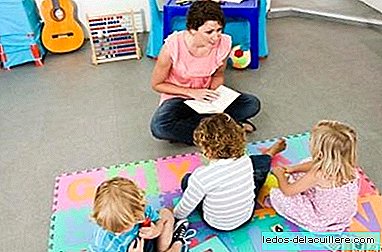
The course has begun and it is usual to begin to listen and read complaints and concerns of parents about how children are cared for in children's schools, since this incorporation into the school system is not always a happy experience. Today we will talk with the teacher Verónica de la Iglesia about this situation: what should not happen in a nursery school.
And, in my opinion and that of many professionals, there are serious flaws in the way some nursery schools are structured and organized and that, logically, makes children unhappy. It makes them suffer and makes them have to go through situations that impoverish their learning and impair their emotional balance.
Of course, in many other schools, things are organized with children and their real needs in mind, but we will talk about them another day. Today our interview is about what should not happen in nursery schools and is to Verónica de la Iglesia: mother of a wonderful child of 2 and a half years old and another on the way and entitled as Higher Technician in Early Childhood Education and Social Integration. She has worked as a first cycle child educator in a public nursery school since 2006 and is currently continuing to train with the White Pedagogy and as a Lactation Advisor.
How should the family-child school relationship be?
It should be a close, sincere and open relationship, where there is a fluid communication that serves to provide feedback for the benefit of the child.
Early childhood education covers a very sensitive age section in which it is impossible to think about working with children without having their families, or limiting their participation to being mere spectators at Christmas festivals, end of year, quarterly meetings and agenda notes .
I advocate for daily communication, not limiting parents' time in classrooms and creating workshops and activities that foster ties between both worlds.
What things do you think they should not ask in an initial interview or, if asked, what can they use that information for?
I have seen interviews of all kinds throughout my years of work experience ... how many hours he sleeps, if he has a room for him only ... they are usually limited to personal data and hygiene, food and sleep issues.
The questions should, first, adapt to the child's age and second, provide data that the educator really needs. I consider it more important that the initial interview be made by the educator with the family and the child present, in a relaxed environment without so many notes or stereotyped questions, to get to know the little one a little more, their customs and the style of parenting.
Is it necessary to make lines?
Absolutely not, unless it is a part of a psychomotor session, or you are working the line and want to show it from the experience rather than on paper.
The lines as a way to move the group from one room to another are unnatural and limit the child's autonomy. Is it that adults go in a row one by one and silently through the office, the mall, the beach ...? Right no?
They are one more way to limit the acts of children, to nullify their will to have them controlled.
How would you define a bad school adaptation policy?
It is a bad policy that does not respect the child's individual rhythm.
It is not a good policy either to choose your method based on the needs of the school and not those of the child. You have to think about the child first, the adaptation is for everyone, but the family and the school must adapt to the child and not vice versa, which is usually quite common.
It is a bad policy that stipulates rigid hours of stay in the center, which sets limits to terminate the adaptation, which ignores or cancels the opinion or participation of families. For example: the child who in a month is not adapted happens to do full-time yes or yes.
Why is it inappropriate to force the child to go to school at a certain age such as three years without diapers?
To start because it is not natural. Each child has its own maturational rhythm, there is no natural law by which the sphincter is regulated when he turns three or two or four, therefore nature cannot be forced.
The consequences are much more negative and much more important than it may seem to us because, when the child is not prepared for it, learning becomes aggressive, imperative, not at all respectful.
Moreover, according to pediatricians, the lack of sphincter control is not considered a problem until it exceeds five years of age, so it makes no sense to pretend that children leave before forced.
So far for today. Next Friday we will continue interviewing the teacher Verónica de la Iglesia about what should not happen in a nursery school and I will continue working, because in the coming weeks we will talk with more education professionals who will tell us what should happen in the ideal nursery school.












